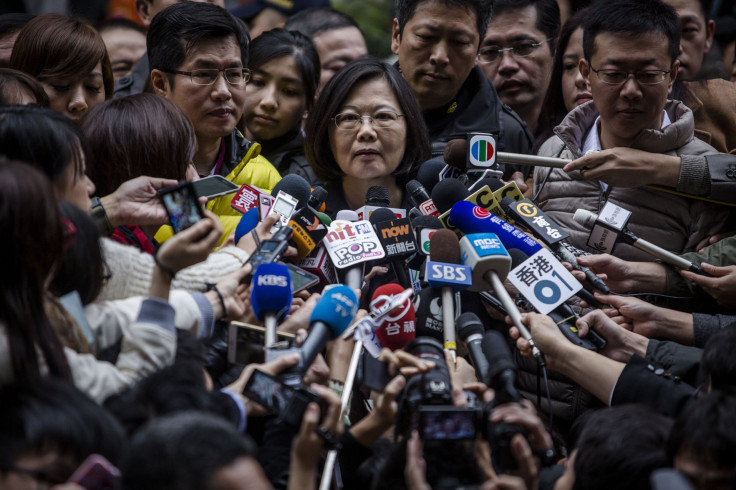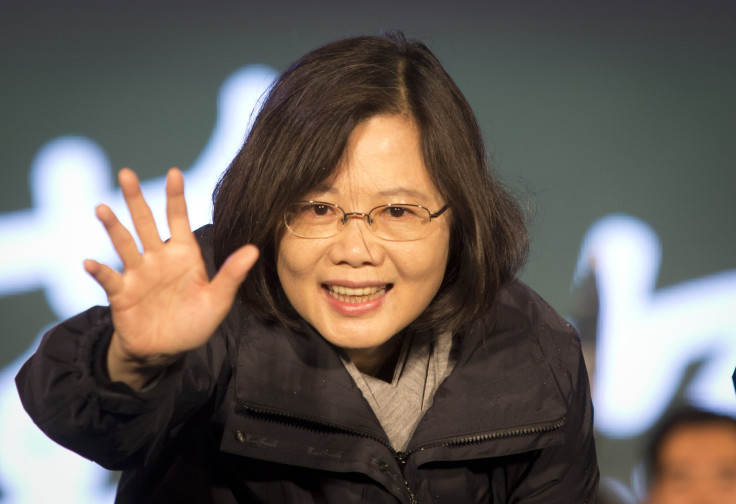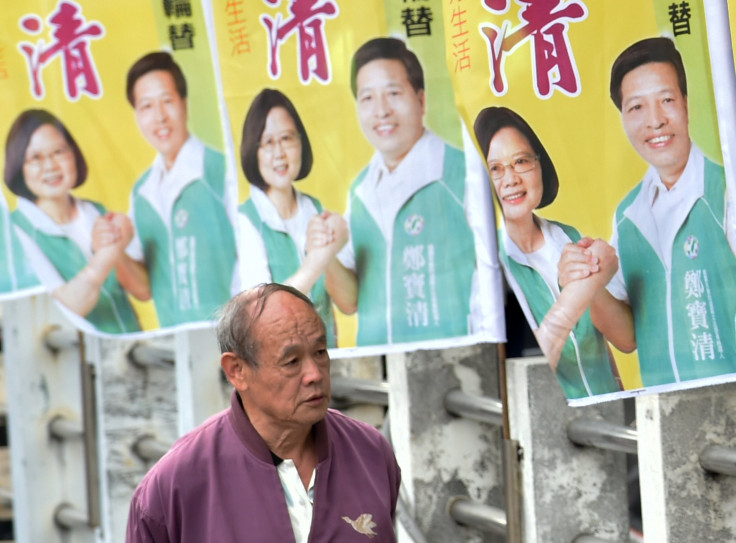Taiwan’s Presidential Election Could Result In Increased Tensions With China

SHANGHAI — The people of Taiwan go to the polls Saturday to elect a president and legislature to govern the island of 23 million people for the next four years and, hopefully, pull it out of the economic doldrums that have seen growth fall to little more than 2 percent a year. But, as always, mainland China, just 110 miles away across the Taiwan Strait, will cast a long shadow over the island’s voters as they cast their ballots. China is Taiwan’s largest export market, with two-way trade across the strait worth an estimated $200 billion a year.
Relations between Taipei and Beijing have been comparatively harmonious during the past eight years, as Taiwan’s President Ma Ying-jeou has promoted closer economic links with China, signing more than 20 trade accords and even holding talks with President Xi Jinping in Singapore in November. It was the first meeting between leaders of the two sides since Ma’s Kuomintang (KMT) fled to Taiwan in 1949, after losing a civil war on the mainland to the Chinese Communist Party. Ma also opened direct air and sea links across the strait for the first time since the same year.
It’s all been in marked contrast to the frosty lack of communication between the two sides from 2000 to 2008, when Ma’s predecessor, Chen Shui-bian, stalled on opening transport links with the mainland and did his best to avoid pledging allegiance to the so-called 1992 consensus, a tacit agreement reached by the two sides that China and Taiwan are ultimately part of the same country. (China still regards Taiwan as part of its territory, and has threatened to use force in the event its leaders ever declare formal independence.)

Now the woman some have described as the “architect” of Chen’s mainland policy during his administration, Tsai Ing-wen, looks set to become president, bringing the Democratic Progressive Party (DPP), traditionally seen as pro-independence, back to power. Tsai has said she will not provoke China, but some are warning that relations could be in for another rocky period, which could damage the economy still further, and potentially increase political tension with a Chinese leadership that has become increasingly assertive on territorial issues under Xi.
“Cross-Straits relations will definitely face a downturn if the DPP wins,” Wang Jianmin, a Taiwan specialist at the Chinese Academy of Social Sciences in Beijing, told China’s official Global Times newspaper this week.
Ironically, it is Ma’s rapprochement with China that is seen as a key factor in Tsai’s anticipated victory. While improved ties across the strait have brought an unprecedented surge of Chinese tourists — and students — to Taiwan, and given greater protection to the Taiwanese manufacturing firms that have invested some $100 billion on the mainland, these developments are generally perceived to have benefited big businesses (many with links to the KMT) far more than ordinary Taiwanese citizens. And in a reminder of the deep paranoia in Taiwan regarding relations with China, public anger over perceived secrecy during Ma’s trade negotiations with Beijing led to the storming of the island’s legislature by student demonstrators, who occupied its building for more than three weeks in 2014.

Jean-Pierre Cabestan, a specialist in Taiwan politics at Hong Kong Baptist University, told International Business Times that Ma had been a little unlucky with the timing of his economic overtures to China. “It wasn’t all his fault — there was a major financial crisis just as he was elected, and China has had a slowdown, too,” he said. “But he promised so much, that closer links with China would improve the economy and benefit all, and when it didn’t happen, he has had to take the blame.”
Ma’s meeting with Xi, hailed by some as a breakthrough, was seen by others as typifying his emphasis on Chinese rather than Taiwanese identity, Cabestan said. In an increasing polarized society, where a sense of distinct Taiwanese identity has developed strongly in the past two decades, that could be a losing gamble: The KMT already relinquished control of five major cities after local elections in 2014, in what was seen as a protest vote. Some analysts said it could soon lose control of Taiwan’s legislature for the first time in 70 years. And they also said some traditional KMT voters are likely to desert the party to vote for Tsai, believing she will offer more hope for ordinary people tired of low wages, expensive real estate and a worsening environment.
“People see the KMT as trapped in an interest structure that ties it to big business,” said Wu Jieh-min, a researcher at the Academia Sinica in Taipei. “The DPP has less burden: It’s a grassroots party, and is seen as caring more about what people need. It would likely raise the minimum wage substantially, offer more tax incentives for companies and protect the environment better — environmental standards have deteriorated over the past eight years.”
‘The Business World Is Worried’
But the KMT warns a protest vote that puts Tsai in power could have dangerous consequences.
“The business world is worried,” Jason Hsu, a KMT candidate for the legislature and an adviser to the current president, told IBT. “Tsai seems to be a centrist kind of person, she won’t take a hard-line approach. But she will face pressure from within her party, and that could lead to diminished relations with the mainland. China will be very wary of her.”
Chinese academics have expressed concern that Tsai has not echoed President Ma’s support for China’s claims to sovereignty over disputed islands in the South China Sea that are also claimed by several Southeast Asian countries. There is also suspicion that Tsai might end the so-called diplomatic truce introduced by Ma: This move suspended the traditional “checkbook diplomacy” battle in which China and Taiwan competed for diplomatic allies, frequently offering nations large amounts of aid or investment to change sides. (China will not recognize any country that has formal relations with Taipei, which it considers to be only a provincial government, not a sovereign state.)
Chinese analysts have warned such changes may lead to expressions of dissatisfaction by Beijing, one of which might be a restriction on the number of Chinese tourists, currently some 4 million a year, flocking to Taiwan.
Hong Kong Baptist University’s Cabestan said Tsai, a softly spoken law graduate of both Cornell University and the London School of Economics who led Taiwan’s body in charge of unofficial negotiations with China in the late 1990s, has been cautious in her public statements and has not completely ruled out endorsing the 1992 consensus, saying it was one of several options. “For the DPP, that’s already going a long way towards China’s position,” Cabestan said.
But he doubted Tsai could formally endorse the consensus. “She’s a good politician, but she is treading a fine line with her party’s voters,” he added. And he suggested that the inability to endorse the consensus could lead to a downgrading of talks between the two side’s civilian negotiating bodies: Taiwan’s Mainland Affairs Council and China’s Association for Relations Across the Taiwan Straits.
But while China “may threaten, it still wants to keep Taiwan doing business with China,” and would be unlikely to sever links completely over such issues, Cabestan said.
And the Academia Sinica’s Wu argued that “Tsai has enough power to control her party. If she made major concessions to Beijing, there would be pressure on her from within the DPP, but I believe that people trust her enough to deal with China, so if she holds talks with Beijing, they would accept it.” He added, “I’m positive that there will be no imminent crisis, for tourism, trade or investment between the two sides.”
Taiwan’s business community in mainland China is estimated to encompass as many as 1 million people, mainly in Fujian and Guangdong provinces, and in the Yangtze Delta region around Shanghai. Traditionally, it’s been seen as backing the KMT and fearful of the effect of a DPP victory, with many businesspeople booking flights back to Taiwan at election time simply to cast their votes for the KMT (as Taiwan does not permit voting from abroad).
‘A Lot of It Is Just Election Talk’
But not everybody is so worried. One Taiwanese investor in southern China, who requested not to be named, told IBT that he wasn’t going back to vote, but if he did, he would choose Tsai and the DPP. He had been a supporter of the KMT in the past, he said, but now he wanted “a more down-to-earth approach. We hope that Tsai will be practical and protect our interests — the current government’s policies are all for big companies.” And he said he did not expect China to overreact to a Tsai victory.
“A lot of it is just election talk: I think she will take a centrist approach,” he said.
At the same time, Tsai is expected to put more emphasis on concluding other trading accords, to shift the focus away from reliance on China, with a move to join the U.S.-backed Trans-Pacific Partnership (TPP) group likely to be a high priority. the Academia Sinica’s Wu said such a move could be hindered by a row over imports of U.S. pork, which Taiwan bans because of concerns over chemicals sometimes used in rearing pigs in the U.S. And he said it could take between two and four years to reach a deal. But he said joining the TPP group was seen as a way of “overhauling Taiwan’s economy, of pushing it to open up, though it must be in a way that would not cause too much damage to ordinary people.”
Wu said a shift away from dependence on China was timely. “The Chinese economy is slowing down; there are worries it could face a hard landing,” he said. “And the era of cheap labor and cheap land in China, which attracted so many Taiwanese companies, is now exhausted. We’ve already seen many companies moving to Southeast Asia.”
KMT legislative candidate Hsu agreed Taiwan needs a change of economic focus. The 37-year-old founder of the TEDx Taipei talks forum is one of a new generation of politicians brought in by the KMT to “change its DNA,” as he put it, in an acknowledgment that “people see us as the old guard.” He said Taiwan needs to take urgent action to revive its innovation culture, by cutting bureaucracy, both to make it easier for businesses to launch and to attract more foreign investors.
But Hsu also said the island needs more engagement with China, not less. As China increasingly draws in investment for startup businesses, he said there should be more dialogue with the mainland’s growing community of entrepreneurs to help pool the skill sets of both sides.
“We need a new type of communication. We need the Chinese market, and China needs our culture, our sophistication. I always say, ‘We can be the headlights on the China train,’” he said. "But, first of all we must talk to each other.”
If Tsai Ing-wen wins and is prepared to follow this advice and continue Taiwan’s dialogue with China, it’s not impossible that the two sides could avoid the worst of the tensions of the last period of DPP government, according to one Chinese academic.
“She has said she wants to talk and avoid mishaps,” Liu Guoshen, dean of the Taiwan Research Institute at Xiamen University, wrote in a recent Chinese media commentary. “If she acts in a pragmatic way and seeks more common ground with the mainland, cross-straits relations will be likely to proceed.”
Yet the sensitivities of the relationship mean that Tsai Ing-wen is likely to be wary about rushing into dialogue with Beijing. And in the near term, China is likely to return to the safety-first policy it adopted in 2000, when Chen Shui-bian became the first DPP politician to lead Taiwan. China said at the time that it would “listen to his words and observe his actions.” And that could mean, at the very least, a slowdown in new initiatives across the Taiwan Strait.
© Copyright IBTimes 2025. All rights reserved.






















